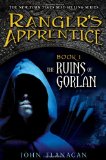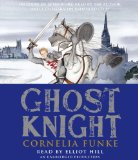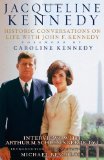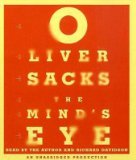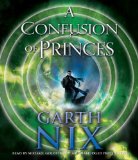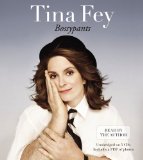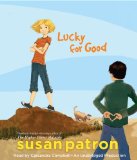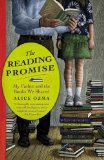 The Reading Promise
The Reading Promise
My Father and the Books We Shared
by Alice Ozma
Narrated by the author
Hachette Audio, 2011. 7 hours on 6 CDs.
Starred Review
It should come as no surprise that I’m crazy about a book about a father reading to his daughter. Alice Ozma and her father Jim Brozina had “The Streak” going — he read to her for 3,218 days in a row, from a day when she was in third grade to the time she went off to college.
My initial reaction? I’m mad at myself for never counting the nights their Dad and I read to our sons. And what a brilliant idea! With a “streak,” the kids don’t decide they’ve outgrown being read to nearly as soon. Indeed, Alice’s father had exactly that in mind, because he didn’t want Alice to decide she was too old for this, as her sister had done. Obviously, the strategy worked beautifully.
Alice Ozma reads the audiobook herself. At first, I thought her voice sounded way too young for it, but as the book got going, since she’s talking a lot about when she was a child, that is perfect, and I got used to her voice by the time she was talking about being older. In a lovely touch, her father narrates the foreword he wrote, and reads all the sentence excerpts from classic children’s books placed at the beginning of each chapter.
This isn’t an outline of every book they read. They don’t talk about every day of reading. Instead, there are lovely vignettes about different times in Alice’s reading life and her relationship with her father.
And my goodness, they have some entertaining vignettes! I laughed and laughed over the way Alice’s father convinced her she could go out on a highwire act — except they didn’t have a costume the right size. Or the way the family accommodated her at the funeral of Franklin the fish. Or how her father convinced her that getting in the dreaded kiss-lock with a boy was life-threatening. But the funniest one of all (and I’m just a little ashamed of saying this) was when she talked about her terrible fear of the corpse of John F. Kennedy.
To be completely fair, it was not the person himself whom I was afraid of, initially. I was afraid of his dead body, and I had somehow become convinced that it would appear one night on my bottom bunk, all laid out and ready for a funeral. I don’t know where I got this idea, and I’m happy to report that today it makes me laugh. Then, though, it was a very grave and serious matter.
Every night, I would go through a huge ordeal to avoid the body. At first I tried going to bed while it was still light out, but because it was winter that only gave me an hour or so from the time I got home from school. And if I went to bed early, it meant waking up early, while it was still dark out. So the darkness was unavoidable. Instead, I tried turning on all the lights in my room and sleeping with them on. My parents didn’t even yell at me, but finally the overhead light in my room burned out and I wasn’t tall enough to replace it. My father was, but I think he made a conscientious decision not to do so. As I got older, contrary to my parents’ expectations, the fear actually got stronger. By middle school, avoiding JFK’s dead body, which was obviously lying in state on my bottom bunk, was the focus of my evening….
The fear soon shifted from JFK’s dead body to JFK in general and included even photos of or quotes about him. So it was with great terror that I learned my father was planning a family trip for my sister and me shortly after my mother moved out, and one of the stops was the JFK Memorial Library. My father tried to convince me that I liked libraries more than I feared JFK. I had to point out to him that he did not know his own daughter.
I like the way she finishes off that sad but hilarious chapter:
I couldn’t appreciate it then, but it takes creativity to lie shivering and shaking in your bed, wondering if your cats will know how to defend you, not against ghosts or the boogeyman, but against the immobile body of one of the most famous and beloved ex-presidents of the United States. Thanks to The Streak and my father, imagination was not something I lacked.
The book does progress beyond these vignettes to a sad story of its own. Alice Ozma’s father was a school librarian, and an outstanding one, who emphasized reading to children. In the name of “progress” he was ordered to stop reading to them, to emphasize computers, and his entire collection was put in storage. Here’s where he tells Alice, now in college, about it:
“Neither of them understand what I’m trying to do. [The principal] ordered hundreds of new books this summer without listening to my suggestions. He said we needed all new, current books because students like new things. He put everything but the picture books, fiction or nonfiction, in storage.”
I put up my hand to fight in defense of the collection my father had spent years building, but he raised his eyebrows and gestured his hands in agreement and continued.
“I know! It’s absurd! Here’s the worst, Lovie — the library already owned some of the books he ordered! We had them in hardcover, and he ordered them in paperback. I never order paperbacks because they fall apart in less than a year. He ordered flimsy, paperback versions of books we already had. After all the budget cuts, that is how he uses our precious library money. When there are things we really needed, books that the children would have cherished. And where is the collection I spent so many years putting together? In boxes, in the school basement.”
Mr. Brozina did fight back, but eventually, he retired. However, Alice got a front row seat on this battle and how much it hurt the kids in the school. By the end of the book, her dad’s reading to seniors and preschoolers and to children in hospitals.
But inevitably, his mind wandered back to the children he had left behind. After working in a school made up mostly of minorities and almost entirely of children who qualified for free lunches from the state, he always worried about the students who slip through the cracks. A library without books seemed like a nightmarish punishment for students who desperately needed literacy to move on in the world and rise out of poverty. I knew that he couldn’t settle with the injustice for too long. His announcement did not come as a surprise.
“I’m running for the school board,” he said one day, as though waking up from a long nap.
Alice Ozma ends her book with something of a manifesto.
We called it The Reading Streak, but it was really more of a promise. A promise to each other, a promise to ourselves. A promise to always be there and to never give up. It was a promise of hope in hopeless times. It was a promise of comfort when things got uncomfortable. And we kept our promise to each other.
But more than that, it was a promise to the world: a promise to remember the power of the printed word, to take time to cherish it, to protect it at all costs. He promised to explain, to anyone and everyone he meets, the life-changing ability literature can have. He promised to fight for it. So that’s what he’s doing.
She ends with a sample Reading Promise in which you can fill in your own name, with this explanation:
My father was not the only person to make this promise. I made it, too, just as millions of people have made it around the world. Since books were first created, copied by hand beside glowing firelight, many have recognized them for the treasures they really are. Men and women everywhere have valued and protected these treasures. They may not start a reading streak, but the commitment is still there. There is always time to make the commitment to read and defend reading, and it is a commitment that is always worthwhile. This is more important now than it has ever been before. Unfortunately, my father’s situation is not unique: day by day, literature is being phased out of our lives and the lives of our children. This is the time to act. This is the time to make a promise.
There you have it. This book includes heartwarming stories about a girl and her father, and it progresses to a call to action about the power of literature. This wonderful story will remind you of the power of reading together and stir you to action.
makeareadingpromise.com
HachetteBookGroup.com
Buy from Amazon.com
Find this review on Sonderbooks at: www.sonderbooks.com/Nonfiction/reading_promise.html
Disclosure: I am an Amazon Affiliate, and will earn a small percentage if you order a book on Amazon after clicking through from my site.
Source: This review is based on a library audiobook from the Fairfax County Public Library.
